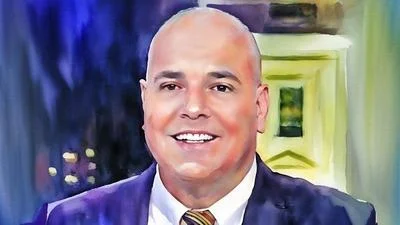Leslie Danford is the founder of Vitaminis.
This transcript has been edited for length and clarity.
Federal Newswire: How did your business get started?
Danford: I've always been a holistic wellness junkie. I believe what you put in is what you get out when it comes to nutrition and your health. I think this ‘food is medicine’ concept is really true. At the same time, I don't love supplements. Pills make me nauseous, and gummies are full of sugar. I was never really satisfied with that.
I had the opportunity to work in the beverage industry, and while I was working there, I saw all sorts of research around what people wanted: clean label, nutrient dense, whole food based. I thought that's what I want to do, and it all sort of came together.
We have these two little products: immune support and gut health. One is vitamin C, zinc, magnesium and orange-pineapple juice. The other is probiotics, fiber and berry-banana juice. We're [also] coming out with daily greens soon.
I first started online at vitaminisbrand.com, because it was pandemic times and that was about all you could do. You can find our products on our own website. We are also on Amazon and recently launched our Walmart Marketplace…and we are in retail as well. If you live in the Midwest, we're at Fresh Thyme and the Fruitful Yield…[We’re having] conversations with a few retailers [to expand], some of which are out on the East Coast, and some are national.
Federal Newswire: What were your first steps?
Danford: It was very incremental: bit by bit. At the very beginning, during the pandemic, schools were shut down. I was at home with my kids. My husband was still working remotely. I was thrown into this stay-at-home-mom role, which I've never been in.
One of the first things I did was just block off some childcare time, find somebody that could come help out so I could spend some time thinking about what was next for me. I think that's important to mention because a lot of entrepreneurs (this might be a woman thing) are saying, “oh, I'll just start a business on the side, I'd really like to be in charge of the kids and be a homemaker, but also do this.”
It's really hard to do that. It takes time. You do have to bet on yourself and say, “I'm going to dedicate even 15 minutes a day,”’ if that's all you can do. That was a really important step, so I did that.
Then, one of the first things I did was interview people. I had an interview guide, and I sat down with friends, family, people that I caught up with. [I asked], “What struggles do you have with your nutrition? What do you do when you read labels or products? What do you look for? What do you think about the products out there? What do you think is missing? What do you like about them?”
I did probably 50 interviews. I used to be a management consultant, so this is the consultant in me doing the market research. I left that process with a really good understanding of what I wanted to do. I had an idea before. I used all those conversations to test and refine that idea. I came out of it with a much more specific idea.
Federal Newswire: What did you learn that helped turn the idea into a business?
Danford: I think that people are becoming much more educated about the importance of nutrition in their health. More people are reading labels now, there's a lot more information out there on the internet or from influencers. That's one major trend.
Also, people are becoming more aware about things like artificial ingredients and sugar. I think in general, more and more people are reading labels, looking for specific things. Looking to avoid specific things when they're making their food decisions, so that's something that I knew theoretically before going into these conversations.
Some people are really intense about what they're looking for on the labels and they're really picky, and others are just glancing. In any case, more people are just doing that in general.
The second big thing I learned is, people are trying to eat better, but it's hard. It's just a pain, all the shopping and the prepping. If you want to do a whole food-based diet, it's just a lot of work. Plus, we have more working parents and families; everything is compressed into the same 24 hours, and it's really hard to do this.
I heard what people were looking for, [which was] actually the first product idea I had. I ended up launching the immune support products because, when I was talking to everyone during the pandemic, that's what everyone was worried about.
From my own experience, I knew that pills and gummy vitamins are problematic: they're hard to digest, they're hard to swallow. I knew liquid was the way to go, but I also knew if I was going to sell this online, which was the only choice at that time, that it had to be small and condensed, easy to ship, and convenient.
[It] all sort of came together…in a six-to-nine-month process. I'm doing the interviews, I'm learning, I'm figuring it out, and eventually landed on the vitamin E shot.
Federal Newswire: Your product is juice-based, and we’re so often told to avoid juice for the sugar. How do you get over initial health biases that could be incorrect?
Danford: It's a balance. If you're too restrictive and you're too hard on yourself, and you're depriving yourself all the time, then you're going to crave these things even more.
It's a similar thought with the juice. With vitamins, there's no added sugar, but there is sugar in here from the juice. The nice thing about it is 2.5oz. It's a great option because it's only five grams of sugar [with] nothing added. It comes from the juice itself, and it has the vitamins, so it can kind of scratch an itch without going overboard.
I think there's a little bit of a shift in mindset away from categorically avoiding certain things and more to looking for natural things, having everything in moderation, being thoughtful and mindful, which I think is a great way to do it.
Federal Newswire: What challenges did you have to overcome?
Danford: You don't know what you don't know. It feels like firefighting sometimes, but that's how a lot of these things happen. On the regulatory side, it could be seen as a challenge, but I thought it was really an opportunity.
The supplement space is like the Wild West. Supplements are not regulated, and you don't really know what's in there. You don't know if it works, you don't know if it's safe, etc. The onus is on the consumer, which is kind of scary. I actually chose to label vitamins as a beverage. We have this nutrition facts panel, just like your regular beverages with calories, so I'm operating under the FDA by doing that.
It’s challenging in the sense that I have to abide by FDA regulations for what's on the label and how I talk about [the product]. I can't say ‘immune boosting’ because that implies that, if you drink this, your immune system will go up. I call it immune support because it has all the ingredients to support a healthy immune system.
It's these nuances [that change things], whereas the supplements can kind of do whatever. I chose to go this route because I think it makes me feel better about the product that I'm offering, that it's safe and compliant. I also think it helps to build trust with the people taking the product, and I prefer that.
Federal Newswire: How is growing the business different from starting the business?
Danford: You can't prevent risks by planning upfront. You may just have some faith in your ability to deal with those things and know that you can handle it. Growing the business is a long process.
One thing that I have learned…is for a food product, especially a nutritional product, people need a lot of exposure before they're going to buy it…They say seven touchpoints is what is required. What are some implications of that? Social media has not been very helpful for Vitaminis. We do social media, [but] I almost think of it as our website—you have to have a presence so people can come look at what you're doing.
But, in terms of getting people to buy, it doesn't really work because you're scrolling. You might see Vitaminis one time and think, “that's interesting,” but you're not going to buy it. We do a lot of email marketing. I love email because we send out expert interviews, educational material about your gut or your immune system, recipes, etc.
Once you're on our email list, we'll send you a weekly email, and you can start to get to know the product and start to understand the benefits over time to come to that decision. Then, when you do decide, it's one click, and you can buy it.
When people buy a bottle in store, they can scan this QR code on the bottle [and] join our email list. Maybe you tasted it, you thought it was good. You're not sure if you want to buy a 12 pack yet, but you're going to learn more about it.
Because of this model, on our website, we only sell the 12 packs, which are $50. It's expensive, but in store, you can try one bottle of Vitaminis for $5. We are looking to expand our retail footprint as a pipeline to get more people in where they can try the one, see if they like it, scan the code, and its sort of an omnichannel flywheel.
My team is really focused on expanding the retail footprint [and] talking to new retailers about bringing in Vitaminis. It's just a very long process. The bigger the retailer, the longer the process. Plus, thinking about which retailers have the customers that are more likely to be early adopters, which in my mind is a natural grocery store.
If you're shopping at a Whole Foods, you're already of a mindset of clean label, so that's the early retailers. Longer term, maybe it is like Target or Walmart, where somebody just knows they need to do something better for their health, but maybe they aren't really deep into the space already. [This is] a lot of where I focus my time: growing that retail footprint. The e-commerce side of things and the email marketing side of things comes along with it.
Federal Newswire: Do you have plans to expand your products?
Danford: Long term. I envision a whole portfolio of mini…whole food based, easy, convenient options. I'm thinking about lots of mini bites, mini sips, maybe mini bars, where it's clean, easy and you get the actual additional nutrition there.
In the near term, we have a third shot that I've been working out for a long time that I'm imminently ready to launch called Daily Greens. Which is the same idea but containing vitamins and minerals from leafy green vegetables like vitamins A, E, D, folate in a green apple and pear juice...so I'm really excited about that. That should be coming out soon.
Federal Newswire: Is the market in America still good for entrepreneurs?
Danford: Entrepreneurship is always about finding the next breakthrough, the next thing. That is really hard. If it was easy, everyone would do it. It's definitely still possible, but the model of how to do it is evolving.
I don't have all the answers. It's about throwing yourself in, finding the way, finding what works, finding that angle and pursuing it; following the crumbs of success to find where you can really drive things. That's always going to be true…It's just changing over time.
The other thing about entrepreneurship right now is the fundraising environment is very difficult. That doesn't mean you can't do it, but it does mean it's not going to be easy. People are holding on to their money. They're waiting to see. They're waiting to exit some investments. That is tough right now. But I think it can be a good thing and that entrepreneurs can be challenged to be a little scrappy or be a little bit more profitable sooner, be a little bit more responsible and make a lasting business sooner. That is a challenge right now, but I see that as more of a near-term problem in the next year or so as opposed to a long-term problem.
Federal Newswire: Who did you go to for your startup capital?
Danford: In the beginning I bootstrapped it myself, [because] I had the benefit of starting this business a little bit later in my career. I did have some money from working in the corporate world that I could spend, but I will say it was very incremental…[I] put a little bit of money to test this and to see if this works a little by little, as opposed to, I'm going to take my life savings and throw it over here.
I think that when you think about it that way, it's very intimidating. But, when you think about it as, I'm going to take a small amount then if it's completely lost, it won't kill me. That's a very easy way to get started with the bootstrapping model.
At this point, now that I've expanded into retail, it's a little bit bigger, and it does require more capital. I do have angel investors now. Some of them are people that I've known for many years, and some of them are people that I've met through angel networks, but I think that's the typical entry road. You don't go to the VCs right away. You have to get that traction with those individuals first.









